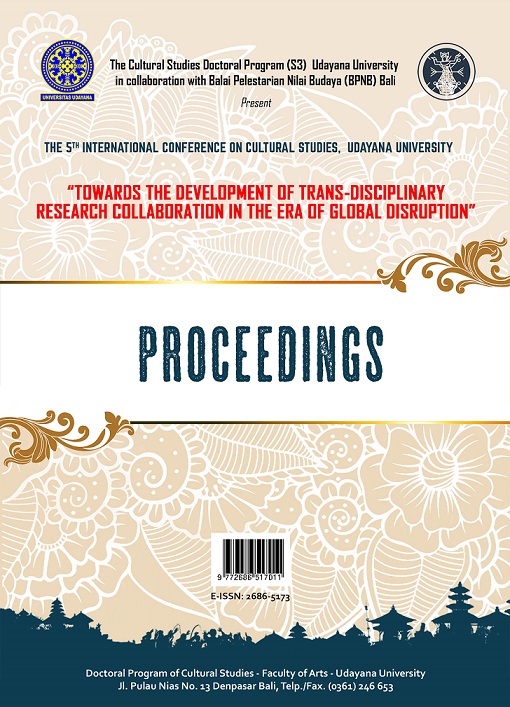TOURISM-BASED CULTURAL IDENTITY CONSTRUCTION IN PENGLIPURAN VILLAGE OF BANGLI
Abstract
This study examines the construction of tourism-based cultural identity in Penglipuran village. The cast of globalization resulted in culture becoming a threshold of confusion for the people of Penglipuran village where they have to keep uppp with modernization or lagging and become extinct. The purpose of this research is the way people of Penglipuran village in preserving tourism-based cultural identity. This research study uses qualitative type by delving into phenomenological informant. The result of this research is the first, the social condition of the Penglipuran community that is very complex, consisting of culture, religion, social solidarity, construction of a tradition-based environment. Penglipuran Village is called as a village that has unique characteristics by reflecting "Bali Age" so it is made as tourism with the portraits of people living in Bali Island. Secondly, the community there rejected the mention of tourism that caused the condition of Penglipuran village now, this is strengthened by the social condition of the people of Penglipuran village that existed since the time of Majapahit where the community began the Penglipuran village Residing in the village of Bayung Gede Bangli. Thirdly, the advent of technological advances from modernization products if generally reviewed has no effect on the cultural identity of Penglipuran village community. The Penglipuran community retains the identity that the ancestors had brought. How to maintain a cultural existence in anticipation of the era of modernization is by customary rules that are physical and non physical.
Downloads
References
Syaputra, A. N. & H. (2010) Kewarganegaraan, Suku Bangsa, Agama, dan Bahasa Sehari-hari Penduduk Indonesia Hasil Sensus Penduduk 2010. Jakarta: Badan pusat Statistik.
Pinasti, B. D. P. dan V. I. S. (2017) ‘Pariwisata dan Budaya (Studi Peran Serta Masyarakat Lokal dalam Pengelolaan Pariwisata di Kampung Pitu, Nglanggeran, Patuk, Gunung Kidul)’, Jurnal Sosiologi.





